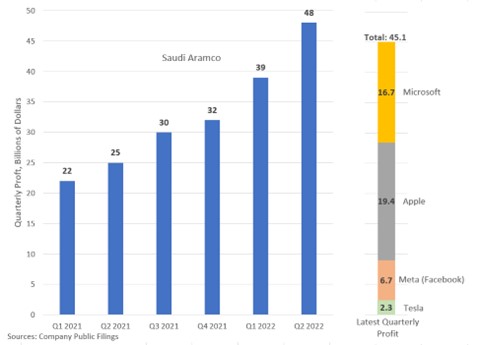Spoiler Alert – not you.
Economist Stephen Moore has published a chart listing quarterly profits of America’s four largest technology firms. The numbers are unfathomable for mere mortals like us. Tesla earned $2.3 billion – that’s not total income, just profits (total income was over $30 billion). Profits were $6.7 billion for Meta (Facebook and Instagram), $19.4 billion for Apple, and $16.7 billion for Microsoft. That is just profits earned in the second quarter of this year, so multiply it by four and you see how rich some of these folks are getting.
As astonishing as those numbers are, though, all four of them combined made less money than Saudi Arabia’s main oil company, Saudi Aramco. Its profits exceeded $48 billion in that same quarter. As Moore wrote, “Saudi Arabia is loving life” these days. The U.S. government’s anti-fossil fuel policies have caused two significant problems for Americans. First, they have dramatically driven up the price of gasoline, home heating, and other energy costs. Second, they have made the economy more dependent once again on foreign energy sources, especially imported oil.

That has implications far beyond the prices we pay at the pump. It is spectacularly enriching Saudi Arabia, China, Russia, Iran, and other producing countries around the world, many of which are not allies. No rational person watching the belligerent behavior of those countries could conclude that sending them hundreds of billions of American dollars is a good idea.
This is a recent development, historically speaking. Oil was only discovered in Saudi Arabia in 1938, by Chevron, and it transformed the entire region after World War II. Before that, Saudis were mostly nomadic, tribal, and comparatively poor. The Saudi economy was bolstered mostly by tourism revenue from Muslim pilgrimages to Mecca. Today, oil generates over $150 billion a year for Saudi Arabia, and the Saudi royal family is the world’s wealthiest, with a net worth estimated at $1.4 trillion. The country is the world’s largest arms importer, spent $68 billion financing civil war in Yemen, and spends fortunes destabilizing Qatar, Egypt, Libya, and other parts of the Mid-East, according to the Stockholm International Peace Research Institute. A vast share of that money came from the U.S. over the past seven decades.
Whether anyone thinks this is smart policy on America’s part, it is reality. U.S. imports of foreign oil have gone from about 150 million barrels a month when President Biden took office to over 204 million last month, according to the Energy Information Administration. The numbers include 300,000 barrels a day from Saudi Arabia, which just decided to cut production to further drive up the price. They laughed when the American President publicly asked them not to do so.
It is beyond hypocritical for Biden to ask other countries not to reduce fossil fuel production, while waging war on production in his own country. But that is the world we seem to be living in today.
It doesn’t have to be this way. For decades federal energy policy ranged from Nixon urging everyone to turn down their thermostats, and Carter suggesting sweaters, to Obama’s attempt to bludgeon the energy industry out of business. The Trump approach instead sought “energy dominance,” and concentrated on lifting regulatory impediments. The result was astonishing, considering Trump was only president one term. By the end of his second year, Investor’s Business Daily reported that “Last week, the U.S. exported more oil than we imported, for the first time in 70-plus years.” It turns out all that was really needed was for government to get out of the way and let the marketplace work.
Government had long warned we were running out of oil, but instead, vast oil and gas reserves were discovered, and advanced technologies like directional drilling and hydraulic fracturing enabled competitive production of those resources. Domestic production skyrocketed, and imports steadily declined – not because of government policies, but despite them. By 2020, the U.S. became the world’s largest producer and exporter, even beginning to send oil and gas to Europe to replace Russian oil.
Biden reversed all that and the U.S. is already back to spending $700 billion annually to import oil. He drained the strategic petroleum reserve by 250 million barrels since he took office, and it now holds just over half its capacity, barely enough to supply 20 days of current U.S. demand during an emergency.
If Biden wanted to deliver the greatest “October Surprise” in the history of election years, he could simply announce a return to 2020 energy policies. Saudi Arabia would hate it, and he could laugh at them.




Great post!
he is not smart enough to do it
Comments on this entry are closed.